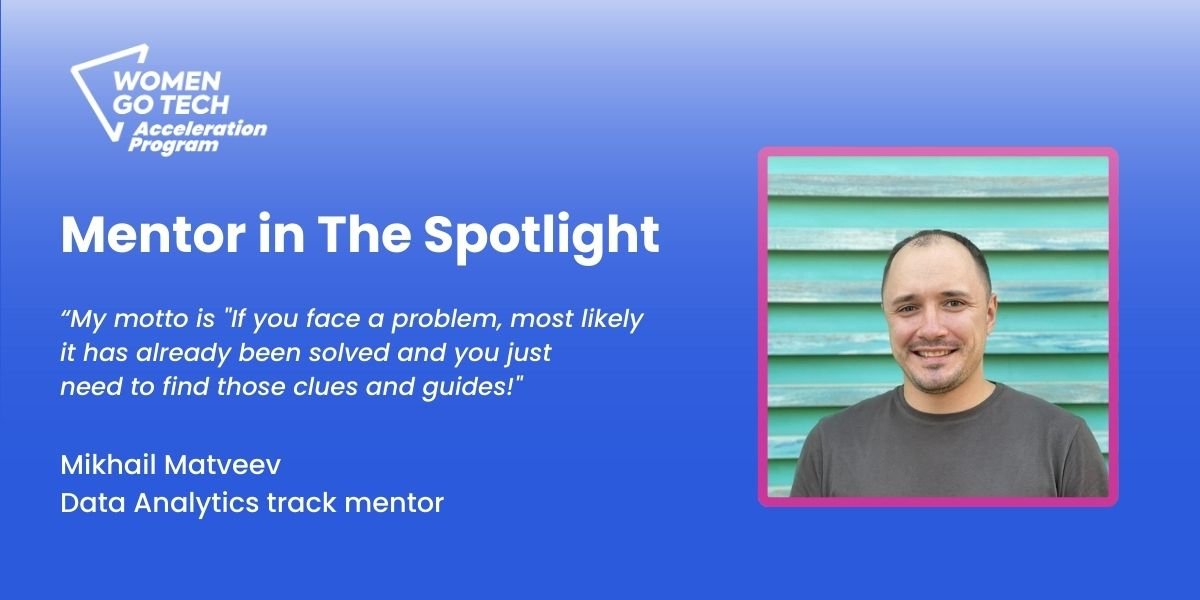Mike Matveev, the CTO and CDO at B9, has been at the forefront of data analytics for over a decade, navigating the evolving tech landscape from a junior position to top management. Now, he’s channeling his rich experience into mentoring, focusing on empowering women in tech through the Women in Tech mentorship program.
In this candid conversation, Mike discusses the transformative power of sharing knowledge, strategies for overcoming career hurdles, and why tech expertise alone isn’t enough to succeed in today’s dynamic industry.

How did you get the idea to become a mentor?
My journey in Data Analytics began 14 years ago. I started from a junior position and then went through all the circles of hell! I’m just kidding, of course, yet every joke has a bit of truth.
I was lucky to have my mentor, who helped me dive into the world of data and look at it from the right perspective. At the time, there were no online academies or courses, so he helped me find books and websites to gain knowledge bit by bit. In my career, I have always learned from other people, asking questions, simply following their steps, and implementing their best practices in my own work. One of the most inspiring examples was my manager at the Binbank team – a lady with incredible technical skills. She taught me to stand for my point of view, to take risks, and to try new things. Now it’s my turn to pay back and help others!
What job issues can be better approached or solved with a mentor’s help?
I started in the banking sphere and have been in different functions – from collection department to sales, product development, operations, marketing, etc. Both in large banks and fast-growing startups in more than 8 countries. I would say despite location, corporate culture, and mission, every banking business has similar “pains”:
– misunderstanding between functions
– inaccurate requirement language
– chaos in teams’ work (waterfall of urgent tasks)
– lack of profound goal-setting and shared vision
In other words, bad management and miscommunications can ruin a promising project even if the competence of the IT team is extremely high.
Data analysts are often treated as supportive IT workers. How can mentorship help a person overcome this stereotype?
For me, an analyst is not just a “service worker” but a specialist who understands a particular business area and can advise the best solution to the function leader. In fact, becoming his partner in finding new ways to boost the processes. Data analysts are the ones who see new directions, open new doors to the teams, and notice subtle signals.
I know many people who are so much focused on technical development that they just don’t see other opportunities lying in their hands.
Sometimes development is not about getting as much new knowledge as you can, it’s about posing the right question. And this is the moment when a mentor can be really helpful!
In general, my motto is “If you face a problem, most likely it has already been solved, and you just need to find those clues and guides!”. Go ahead and just Google it!
How is the mentorship process organized?
It has some formal structure, such as an introduction, discussion of expectations, goal setting, building a framework, etc. We schedule meetings, communicate in chats, share useful links, and discuss particular issues. The whole mentorship lasts from 3 to 6 months, and the progress is always tracked.
At the same time, mentorship is mainly based on a personal approach, sharing experience, giving advice, and developing a leader’s skills. To make the process smooth and pleasant, you need to build trust and good contact. When the mentee opens up, the whole thing goes easier and much quicker.
How did you understand the idea that it’s time to share your experience?
You just start to notice it in your daily working routine: how helpful you could be, how you could guide the newcomers, guiding them to achieve their goals without mistakes, extra efforts and even burnouts. You cannot help but think about it again and again!
Globally, despite the so-called technical development, ChatGPT, and other AI innovations, the data analytics market is still very small. Sometimes it takes up to 6 months or more to find a good specialist. So it’s crucial to help the new people realize what hard and soft skills they need to develop to succeed. And it’s very rewarding, too – you are building the industry!
Why did you join the project supporting women in tech?
There are stereotypes that IT is a male-dominated field, which can lead to biased views from colleagues and employers. Women often have to prove their competence and professionalism more than men. Very often teams in IT companies are mostly male, this can create difficulties in communication and adaptation for women, affect their comfort and work efficiency. I have always had women in my teams and in neighboring technical functions, yet frankly speaking gender ratio was never 50/50. I believe women have huge potential in tech.
You started your career at the beginning of the data analysis era. Don’t you think that the newcomers face different problems?
I’m self-taught and have come a long way. Often, I was literally learning from my tries and mistakes, sometimes being too shy to ask, not really knowing the operations, or lacking technical skills. I believe all the cases I’ve been through can be very helpful to newcomers. Mentees can learn from me and not waste their time going through the same typical cases.
Also, I’d say some people need technical advice, while others have to learn basic communication tips. Mentorship is really an individual process!
The tech industry has a lot to offer nowadays, and one can try him/herself in different directions to understand exactly what he or she wants. You have so many educational programs that your eyes run wild. Yet a certificate of completed course does not grant you employment. You need to prove your experience by compiling a portfolio, for example, using Gitlab to upload your projects in Python or r. A good mentor can guide you on that path and help you succeed.
What are the top 3 personal qualities and skills essential for a data analyst?
As for the personal skills, I would say these are:
1. Persistence
2. Commitment to learning and development
3. Having a “peripheral view”, meaning that you should always look wider than what you need and examine the situation from different angles
As for the crucial technical skills:
1. Analytical skills – ability to analyze data, identify trends, ability to find weaknesses, notice inaccuracies
2. Technical skills in programming and analytics, minimum: SQL, Excel(+DAX) and a plus: Python, R
3. Understanding of business processes – the ability to understand documentation and diagrams, and correlate it with data.
Looking to transition into tech or elevate your career? Join our Acceleration Program.

























